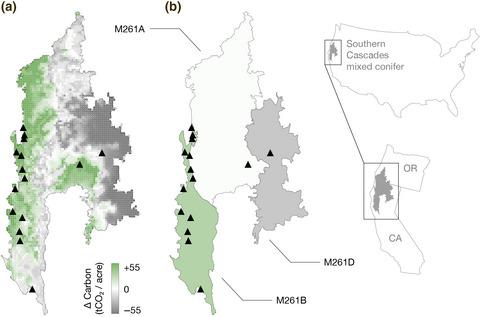当前位置:
X-MOL 学术
›
Glob. Change Biol.
›
论文详情
Our official English website, www.x-mol.net, welcomes your
feedback! (Note: you will need to create a separate account there.)
Systematic over-crediting in California's forest carbon offsets program
Global Change Biology ( IF 10.8 ) Pub Date : 2021-10-20 , DOI: 10.1111/gcb.15943 Grayson Badgley 1, 2 , Jeremy Freeman 3 , Joseph J Hamman 3, 4 , Barbara Haya 5 , Anna T Trugman 6 , William R L Anderegg 7 , Danny Cullenward 3, 8
Global Change Biology ( IF 10.8 ) Pub Date : 2021-10-20 , DOI: 10.1111/gcb.15943 Grayson Badgley 1, 2 , Jeremy Freeman 3 , Joseph J Hamman 3, 4 , Barbara Haya 5 , Anna T Trugman 6 , William R L Anderegg 7 , Danny Cullenward 3, 8
Affiliation

|
Carbon offsets are widely used by individuals, corporations, and governments to mitigate their greenhouse gas emissions on the assumption that offsets reflect equivalent climate benefits achieved elsewhere. These climate-equivalence claims depend on offsets providing real and additional climate benefits beyond what would have happened, counterfactually, without the offsets project. Here, we evaluate the design of California's prominent forest carbon offsets program and demonstrate that its climate-equivalence claims fall far short on the basis of directly observable evidence. By design, California's program awards large volumes of offset credits to forest projects with carbon stocks that exceed regional averages. This paradigm allows for adverse selection, which could occur if project developers preferentially select forests that are ecologically distinct from unrepresentative regional averages. By digitizing and analyzing comprehensive offset project records alongside detailed forest inventory data, we provide direct evidence that comparing projects against coarse regional carbon averages has led to systematic over-crediting of 30.0 million tCO2e (90% CI: 20.5–38.6 million tCO2e) or 29.4% of the credits we analyzed (90% CI: 20.1%–37.8%). These excess credits are worth an estimated $410 million (90% CI: $280–$528 million) at recent market prices. Rather than improve forest management to store additional carbon, California's forest offsets program creates incentives to generate offset credits that do not reflect real climate benefits.
中文翻译:

加州森林碳补偿计划的系统性过度计入
碳补偿被个人、公司和政府广泛用于减少温室气体排放,假设补偿反映了其他地方取得的同等气候效益。这些气候等效性主张取决于抵消提供的实际和额外的气候效益,而事实并非如此,如果没有抵消项目的话。在这里,我们评估了加利福尼亚著名的森林碳补偿计划的设计,并证明其气候等效性声明在直接可观察证据的基础上远远不够。按照设计,加州的计划向碳储量超过地区平均水平的森林项目提供大量抵消信用。这种范式允许逆向选择,如果项目开发商优先选择在生态上与不具代表性的区域平均水平不同的森林,就会发生这种情况。通过对综合补偿项目记录以及详细的森林清单数据进行数字化和分析,我们提供了直接证据,表明将项目与粗略的区域碳平均值进行比较导致系统性过度计入 3000 万吨二氧化碳2 e (90% CI: 20.5–3860 万吨CO 2 e) 或我们分析的信用的 29.4% (90% CI: 20.1%–37.8%)。以最近的市场价格计算,这些超额信贷价值估计为 4.1 亿美元(90% CI:280-5.28 亿美元)。加州的森林补偿计划并没有改善森林管理以储存额外的碳,而是鼓励产生不反映实际气候效益的补偿信用。
更新日期:2021-10-20
中文翻译:

加州森林碳补偿计划的系统性过度计入
碳补偿被个人、公司和政府广泛用于减少温室气体排放,假设补偿反映了其他地方取得的同等气候效益。这些气候等效性主张取决于抵消提供的实际和额外的气候效益,而事实并非如此,如果没有抵消项目的话。在这里,我们评估了加利福尼亚著名的森林碳补偿计划的设计,并证明其气候等效性声明在直接可观察证据的基础上远远不够。按照设计,加州的计划向碳储量超过地区平均水平的森林项目提供大量抵消信用。这种范式允许逆向选择,如果项目开发商优先选择在生态上与不具代表性的区域平均水平不同的森林,就会发生这种情况。通过对综合补偿项目记录以及详细的森林清单数据进行数字化和分析,我们提供了直接证据,表明将项目与粗略的区域碳平均值进行比较导致系统性过度计入 3000 万吨二氧化碳2 e (90% CI: 20.5–3860 万吨CO 2 e) 或我们分析的信用的 29.4% (90% CI: 20.1%–37.8%)。以最近的市场价格计算,这些超额信贷价值估计为 4.1 亿美元(90% CI:280-5.28 亿美元)。加州的森林补偿计划并没有改善森林管理以储存额外的碳,而是鼓励产生不反映实际气候效益的补偿信用。











































 京公网安备 11010802027423号
京公网安备 11010802027423号